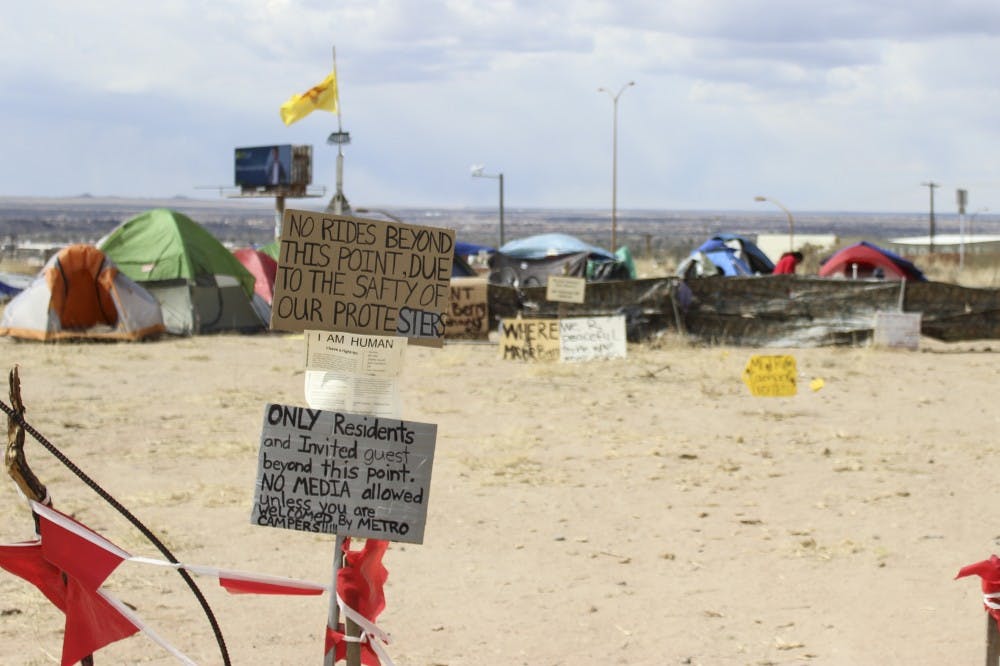UNM released results of an extensive study conducted by the Institute for Social Research, which found that the benefits of paying to house the homeless population far exceed the costs.
The study looked at the Heading Home Initiative, a program that aims to expand resources to house chronically homeless people who are grappling with addiction and connected disorders.
The study analyzed which costs more — housing the homeless or letting them remain on the streets. After an almost three year long process with 95 applicants, the researchers concluded that for every $1 spent, the program yields $1.78 in benefits.
Breanna Anderson, communications director for Heading Home, said five years since the program started, the initiative has housed 610 individuals and their family members, as well as saving millions of taxpayer dollars, all while expanding efforts to end homelessness.
“From an economic development standpoint it is creating a cost savings for taxpayers,” Anderson said. “Since the study has proven that it’s almost 32 percent cheaper to house someone than it is to leave them on the streets.”
Paul Guerin, the senior research scientist at the institute, said most studies on homelessness and its contributing factors typically only look at hospital data, while this study provides data from places frequented by homeless people all around Albuquerque.
According to the results of the study, the most vulnerable living on the streets may wind up in jail, emergency rooms and emergency shelters, and end up going through inpatient and outpatient treatment services.
The study also explained that these services often require acute care. Hospitals are required by law to provide these services, which may be intensified by the circumstances of being homeless.
Research has proven that the heavy use of these services puts a significant financial weight on the public, and can add up to millions per year, according to the study.
For the program model, Guerin said the idea is to make housing the top priority, then begin to tackle other factors which can contribute to homelessness.
Jodie Jepson, Heading Home housing director, said she agrees that the housing-first model decreases drug and alcohol use, and can be hugely beneficial to people with mental health issues, who often don’t take their medication when they’re on the streets.
“It’s not just about housing people, it’s about how we are impacting in providing opportunities for folks to smile,” Jepson said. “Get up each day and hopefully have a good day.”
Get content from The Daily Lobo delivered to your inbox
Previously federally funded programs, which are unavailable to convicted felons, required applicants to maintain employment, stay clean and attend some form of counseling.
Heading Home does offer case management, an opportunity to meet with a specified case manager to go over resources in the community, but contrary to federal housing, this is an optional process.
Anderson said the initiative is a model program and could easily be used across the state and country.
“Several cities, including Lexington, Kentucky and Anaheim, California, have come to Albuquerque to learn about the initiative and recreated it in their respective cities,” Anderson said. “This program is a humane and cost-saving solution to ending homelessness.”
Anderson also said move-in services are available for clients of the initiative, so they can move into a furnished home.
“Due to a big surge in housing, we really need furniture donations,” Anderson said. “Couches, bed frames, dining room tables and chairs, beds, that are new or used, in good condition.”
Guerin said there are benefits to addressing homelessness both locally and nationally, and said the study also adds to the national conversation to combat homelessness.
“Locally, this gives policy makers additional information that helps in foreign policy,” Guerin said. “So now they have this study and they can say this works locally and they can consider using this type of program more frequently and putting more resources into it.”
Guerin described Mayor Richard Berry as a pragmatic business man. Since this study has both economic and social benefits, both liberals and conservatives can agree on the program.
Jepson stressed that partnerships and volunteers created this level of social change.
“We’re so honored to have our valuable partners with us today, to celebrate the impact that we’re having on our community,” Jepson said. “We’re literally changing lives and bringing hope to people who thought they were lost, forgotten, and invisible.”
In a short Heading Home film, Mayor Berry agreed that the initial task is to get people off the streets and stabilized. He said sometimes with chronically homeless people, experts do not have days or weeks, but hours to bring an individual to a mental state where they actually want to leave the streets.
“One of the first things they ask for when they get off the streets, once they are stabilized, is how can they help somebody else,” Berry said.
Sarah Trujillo is a news reporter for the Daily Lobo. She can be reached at news@dailylobo.com or on Twitter @sarahtweets_abq.






